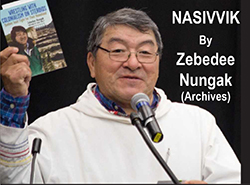
NASIVVIK By Zebedee Nungak,
Windseaker Columnist; Archives 2003
Nasivvik is an Inuktitut word that means vantage point. It can be a height of land, a hummock of ice, or any place of elevation that affords observers a clear view of their surroundings to make good observations.
There is a fundamental flaw in the composition of Parliament, which begs to be brought to national attention: There are not enough Indigenous members of Parliament in Ottawa.
This great lack of Aboriginals in Canada's cradle of power has to be corrected if the country is to deal squarely with the root inequalities that exist as a result of this absence of direct representation.
Among Canada's current 301 MPs, there are actually four Aboriginals: two Métis, one First Nations person, and one Inuk. Needless to say, these ranks are distressingly thin. Considering the high population ratio required by electoral rules for federal ridings, it's a wonder that any of them are even there!
Inuit communities in the Arctic, especially, have populations that are insignificant in the electoral scheme of things, situated as they are in isolated areas spread over great geographic expanses.
In New Zealand, a Commonwealth country like Canada, Indigenous representation is accommodated by reserving seven out of 120 seats in Parliament for the Maori people. If this formula was adapted to Canada's system, there would be 17.5 Aboriginal MPs among 301 MPs presently sitting. Through them, those who were here first would finally be plugged in to the country's political decision-making structure. Their presence would upgrade Parliament's complexion.
The defining statistics of Canadian Aboriginal communities paint a dismal picture. Perversely, positive things like adequate housing, good health, life expectancy, and employment and training opportunities, rate very low. Tragically, negative things are abnormally high; infant mortality, alcoholism, drug addiction, the suicide epidemic, and rates of violence and imprisonment. These features of the national status quo are an ugly blot on Canada's political face.
The settlement of land claims has helped improve the material circumstances of Aboriginal groups fortunate enough to have their cases processed. But, without a permanent substantial Aboriginal presence in the corridors of power, Aboriginal organizations have to plead their peoples' interests by spending lots of money and energy lobbying those who control the levers of political power. The process is full of hazards, and governments have an extremely uneven record in delivering just solutions to Aboriginal needs.
Canada's Parliament should pass a law called the Indigenous Peoples Representation in Parliament Act. Such an act would be designed to make room for Aboriginal Members of Parliament in numbers sufficient for them to be real, working components of national political life, and not mere novelties on Parliament's fringes. It would be a great historical justice, helping to correct the dismal catalogue of wrongs that lie scattered throughout Canada's history.
To accommodate this act, Parliament would have to adopt a set of principles deliberately tilted to favor such an accommodation. The principles would be based on Aboriginality, recognition of the sparse population to expansive geography ratio, communities of interest, and language and culture. These might not appear so different from criteria presently used to determine electoral ridings. However, there would be unique new twists.
For the first time, Aboriginality would be a reason for the creation of new electoral districts. This is going to be revolutionary for Canada. But Canada can check with New Zealand about how it has done this without the sky falling on it for daring to adopt such a thing.
The standard population ratios, which largely rule how electoral boundaries are drawn, would be waived. This is not unheard of. Parliament has previously used its authority to bypass electoral population rules to create ridings in the sparsely populated Yukon Territory, and in Nunatsiaq. Small populations should never shut Indigenous people out of being represented.
The "community of interest" principle would also have to be tuned to Indigenous peoples' unique circumstances.
Inuit did not invent political boundaries, but live in four different jurisdictions. Each of their collectivities should be provided with their own Member of Parliament, based on the Land Claim Settlement Area communities of interest. The federal government has explicitly recognized such units of Inuit interest when they began settling land claims.
Language and culture are absolute "musts" as considerations for the need to have Aboriginal MPs. Many Aboriginal languages are dead or dying. Yet they remain politically out in the cold, with nobody in power daring to go to bat for them. English and French thrive and dominate, simply because they are the only officially recognized languages of the "founding nations".
In encouraging Parliament to be bold and innovative to make room for Indigenous MP's, we need not restrict considerations to the New Zealand formula. If everybody concerned got serious about this, we might even stumble upon more generous Made-in-Canada solutions! Besides, 17.5 MPs would have to be rounded out to a fuller figure! An act enabling greater Aboriginal representation in Parliament is a dream within reality's reach, of which Canadians could be proud.
